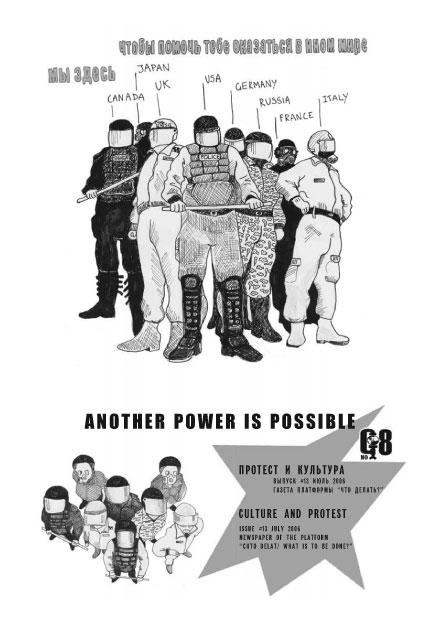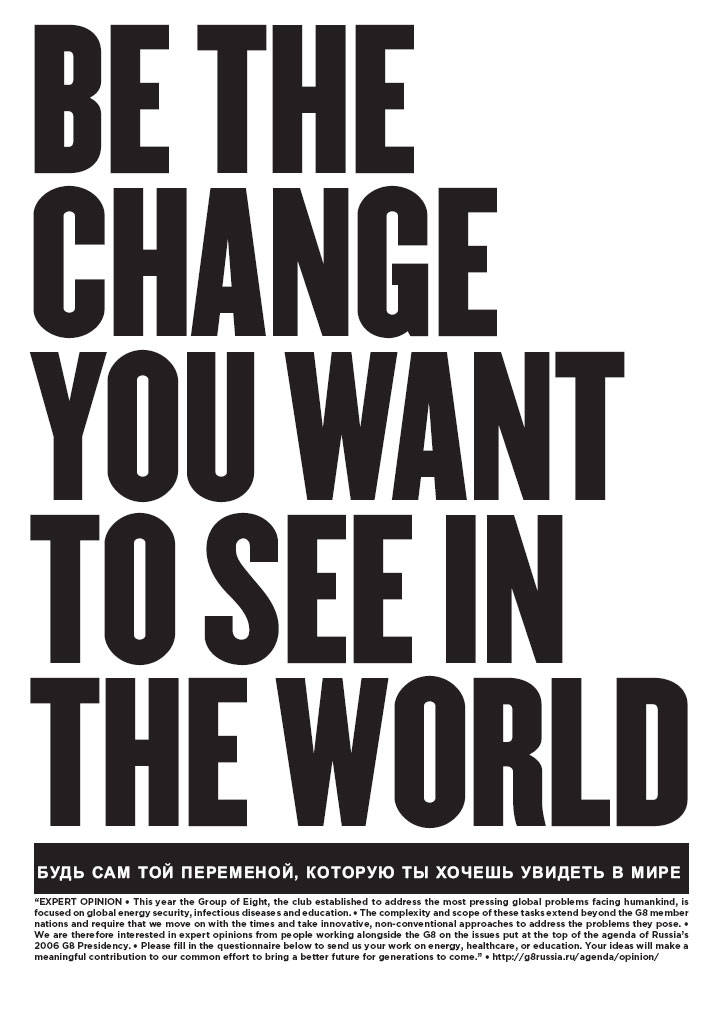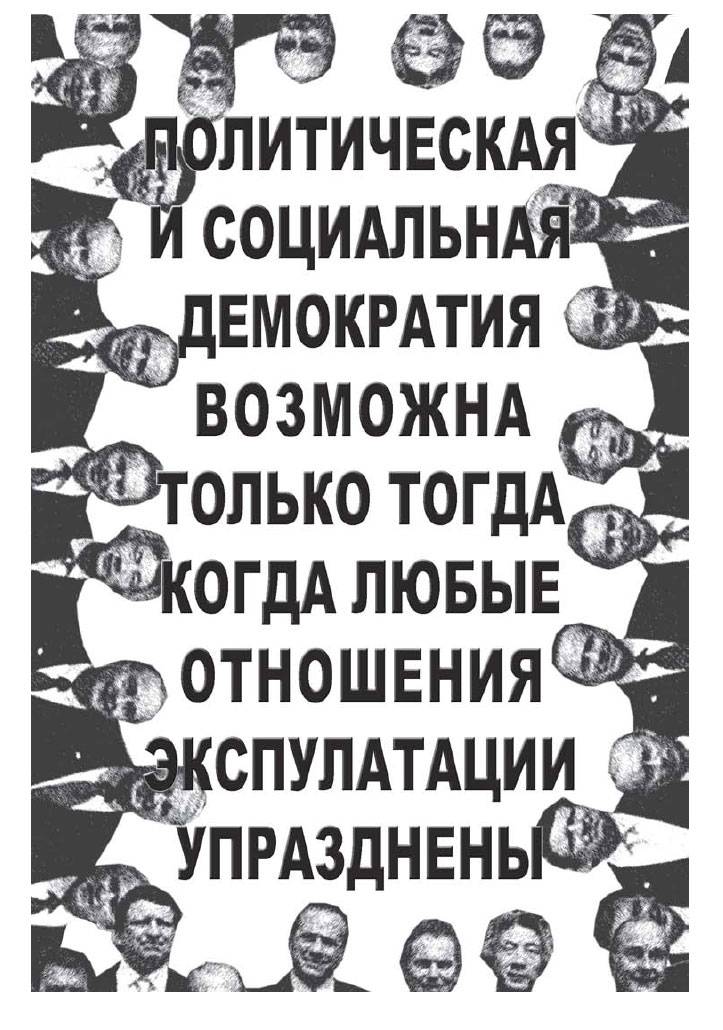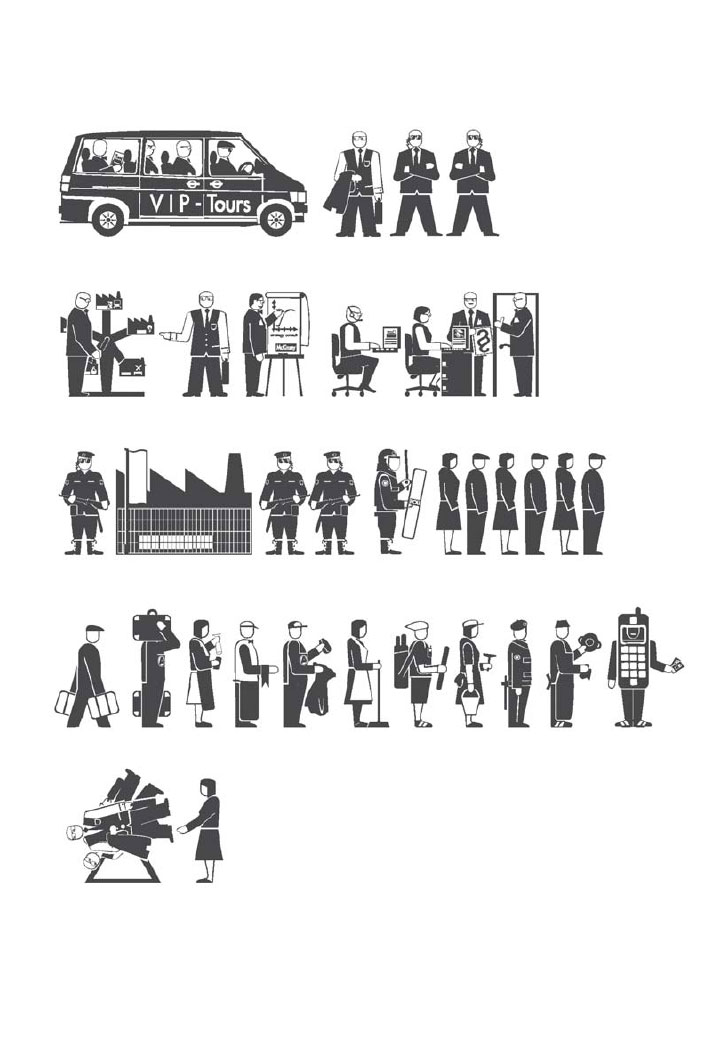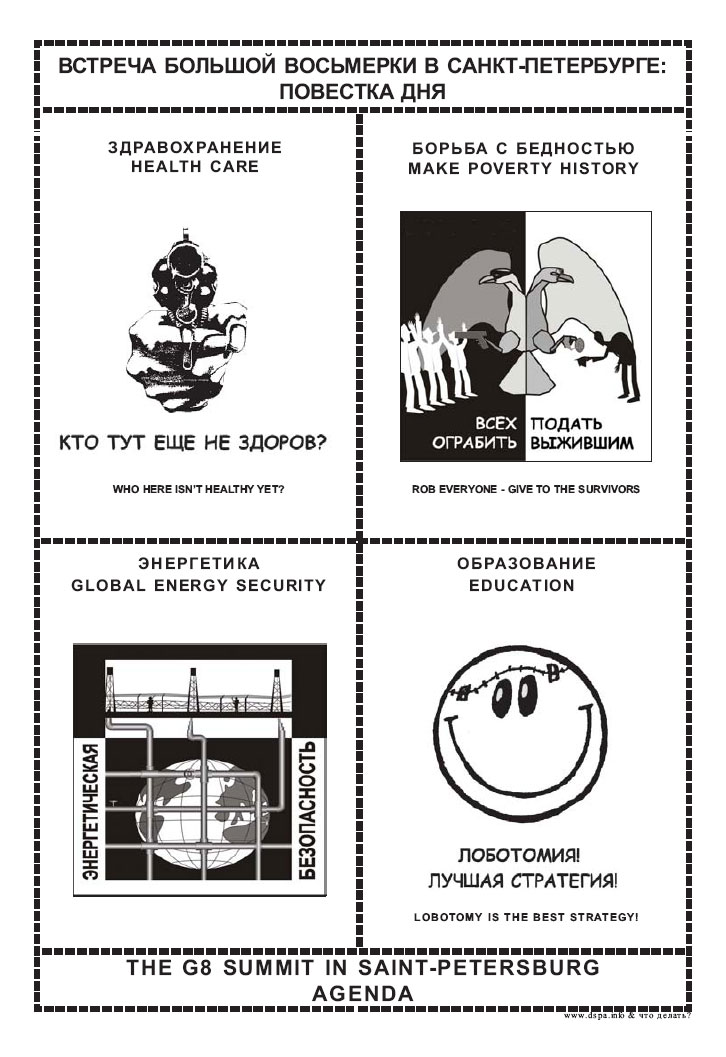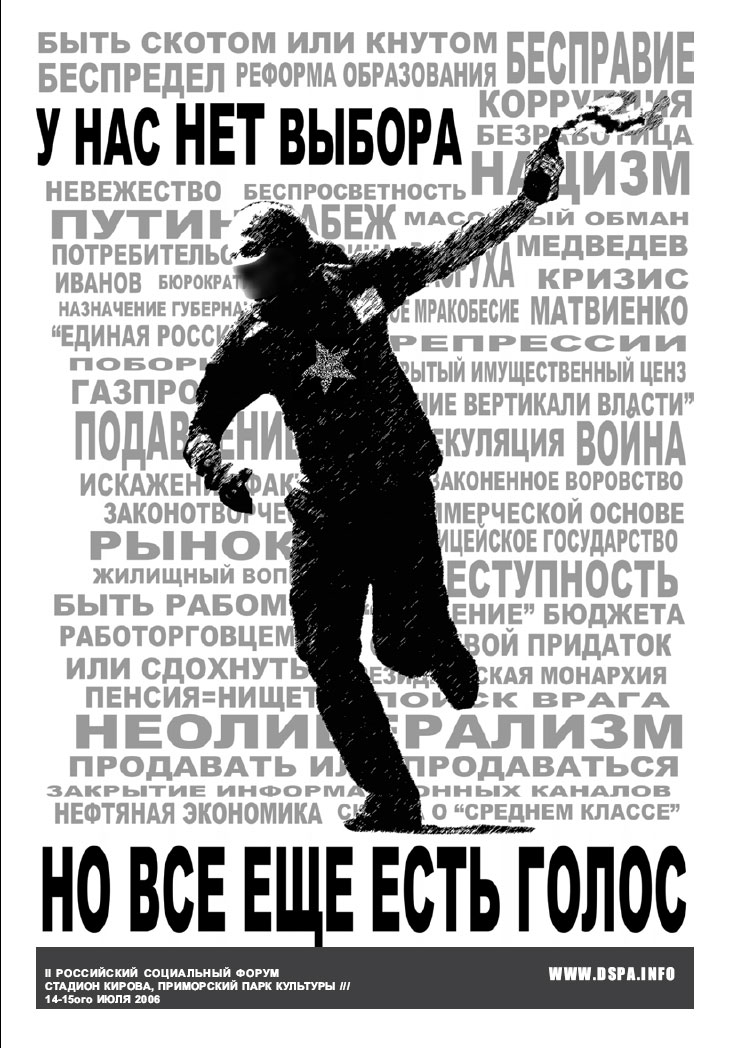#13: Culture and Protest
Preface
I can see that this is a moment in which the whole world’s attention will be on the G-8 meeting in Petersburg, and therefore it is certainly a moment in which the left should appear. It seems to me that this should be an occasion for yet another statement about globalization, but this time, from a Russian left, showing solidarity with the other moments of the same thing: Seattle, Genoa, and so forth.. I think not doing anything is not acceptable. But what do you do?
I’m very reluctant to give opinions about the politics of other countries, but your problem with respect to the G-8 meeting is an interesting one. There would be several possible grounds for a demonstration, and there would also be several fundamental differences between Russia’s situation and that of the other “advanced industrial” countries. To what degree is Russia’s problem of national reconstruction the same as that of the ravages of globalization (flight of industries, unemployment) in the other G-8 countries? More generally, is an opposition to the flight of industries and jobs abroad the same as an opposition to foreign investments? Is the matter of the defense of a welfare state under attack the same as that of the (re)construction of a welfare state? On the question of the political solidarity of a Russian left with that of other countries, it seems to me that a general opposition to the Iraq war and other U. S. adventures abroad is probably shared by many Western European countries, and Putin’s positions are often taken (everywhere) to mean an opposition to that war. On the question of anti-globalization, it isn’t clear to me exactly where the Russian left should stand or does stand. But I think we would all share a general left consensus on the social harmfulness of free-market ideology and “fundamentalism”, and of the free-market policy of indiscriminate privatization: the opposition to that could certainly serve as a unifying left position. But that issue might also look differently within the current Russian political situation; so my hesitations remain.
David Riff /// The Ballad of John and Yoko
If course, we will never succeed in overcoming capitalism if people equate “doing it in the road” to cultural revolution. Trapped in the Adam-and-Eve costume of a youth movement, political praxis cannot ever fully evolve. But was the preceding generation of protesters really that naïve? Weren’t our parents more mature than we think?
Take John Lennon and Yoko Ono. Today, they are remembered as the epitome of flower power. “Just Give Peace a Chance” was one of the first big celebrity benefit songs, with Bob Geldof, Michael Jackson, Bono, and Sting following in a long, peaceful march that eventually led to some bullshit sanctuary like “Live 8” and the “Make Poverty History” campaign. It’s hard to look past the outer shell of long hair, peace activism, mantras, obsessions with white, and donations to “good causes,” past the strange mixture of engagement and pop that the sixties left behind, all those spectacular half-measures taken to clean up after an increasingly messy global capitalism. People often forget that Yoko was one of the earliest feminist actionists, an accomplished conceptual artist, a singularity for whom the “personal was political” in principle. People also forget that John identified with the labor movement and revolutionary socialism more and more the further he got away from Beatlemania. By the time he had released “Working Class Hero,” he was giving interviews to The Red Mole, a Trokyist sheet put out by the British arm of the Fourth International (see https://www.counterpunch.org/lennon12082005.html). Basically, John and Yoko were smarter, more radical, and a little less hung up on superstardom than we tend to think.
Ilya Kalinin /// “Our” Universities
“Cadres decide everything”: in the late 1920s, this Stalinist slogan expressed the state’s reliance on thevydvizhentsi, a new generation of “promoted workers” that formed a mid-range elite, servile and loyal to the party apparatus and its general secretary, to whom it owed its promotion. Around the same time, the term “cadre forge” also emerged, which expresses the state’s nearly Foucaultian view of power as knowledge. If one knows, one can come to power and take control over its production and dissemination. All of this made Francis Bacon’s famous phrase that “knowledge is power” sound frighteningly material.
Kirill Medvedev / Sergei Ogurtsov /// “Interrogating the good person within myself”.
On March 17th 2006, the workers of the Yaroslavl factory Kholodmash blockaded the factory administration,, demanding that wages withheld for many months finally be paid and that Kholodomash be saved from closure through renationalization. After the region’s deputy governor for industry conceded to talks, the workers lifted their blockade. As was to be expected, negotiations held between activist workers, the administration, and the regional authorities soon found themselves in a dead-end. At this point, the workers of Kholodomash were already in contact with local activists. Together, they organized a political meeting and blocked one of the city’s central streets. The struggle reached its highpoint with a hunger strike, during which the head of the factory’s independent trade union Olga Boiko and a number of her colleagues barricaded themselves up in the factory administration and hung posters out of the windows with their demands. Again, the administration was able to maneuver its way out of a tight spot. As soon as the hunger strikers were told that all remiss wages would be paid in full, most of them declined to continue the struggle. (See https://yaroslavl.socialism.ru/ for coverage in Russian.)
Alexei Penzin /// “Antiglobalist Slogan”, or, What is a political demonstration today?
– I wasn’t here, – we wanted to set up our demonstration here, – but it didn’t work! There were too few of us then. But come this year! You’ll see!”
M. Gorky, “Mother”
The Sormov demonstration of 1902 was one of the first political mass mayday demonstrations in pre-revolutionary Russia. On May 1st, half of all the Sormov factory’s worker went on strike. Demonstrators carried slogans like “Away with Autocracy!”, “All Hail to Political Freedom!” The police tried to break up the gathering, but met serious resistance. When troops arrived, the demonstrated began to sing “You Have Become Victims,” a revolutionary funeral march. A worker named Zalomov stepped forward to meet the soldiers, raising a red flag. He was arrested immediately. Troops and police began beating and arresting workers en masse. Six people were sentenced to life long exile in Siberia. The newspaper Iskra published the workers’ speeches with a foreword by Lenin. Maxim Gorky described the demonstration in his novel “Mother.”
* * *
The forms of protest that exist today – meetings, demonstration, walk-outs, strikes, hunger-strikes – were invented and reinvented throughout the many decades of the international movement on the left.
Maurizio Lazzarato /// Struggle, Event, Media
Why can the paradigm of representation not function in politics, nor in artistic modes of expression, and here especially in the production of works that employ moving images?
I will attempt to answer these questions by using the paradigm that imagines the constitution of the world from the relationship between event and multiplicity. Representation is conversely founded on the subject-work paradigm. In this paradigm the images, the signs and the statements have the function of representing the object, the world, whereas in the paradigm of the event, images, signs and statements contribute to allowing the world to happen. Images, signs and statements do not represent something, but rather create possible worlds. I would like to explain this paradigm using two concrete examples: the dynamic of the emergence and the constitution of post-socialist political movements and the way television functions, in other words, signs, images and statements in contemporary economy.
The days of Seattle were a political event, which – like every event – first generated a transformation of subjectivity and its own mode of sensibility. The motto “a different world is possible” is symptomatic for this metamorphosis of subjectivity and its sensibility.
Be the Change You Want to See in the World
Read MoreNikolai Oleinikov /// G2
Excavator – dr-dr-dr-bk-bk-dsh-dsh-dsh…
John – We met only eight days ago, and we’ve been sleeping together in different places every day since; the weather’s great. Let’s spend this day here in nature (though I wonder what this techno-monster is doing here? How did this excavator turn out to be in an open field?! What a loud and stinky freak)
Yoko – Today the G8 summit is coming to town, don’t you remember? We have to peel ourselves off one another and hit the streets, and join the demonstrations, which will have only one and a half people either way.
John – You’re serious, aren’t you?! But at least, let’s give it another go, and let’s see what happens after that.
Yoko – It makes sense to seize the day and somehow express our protest against all of this shit, against the total meta-state of injustice, lies, and filth that they are planning to build.
John – Help me out a little, because I seem to be a little tired (or is the excavator?)
Yoko – Universal fatigue, apathy, lethargic reactions, and the habituation to the fact that everything is decided without our consent, without even asking our opinion. All of these things are dangerous symptoms.
Yoko – They hold all the levers in their hands, controlling all flows of energy ranging from money to natural resources. The longer we we fail to act, the more actively and rapidly they will develop.
John – It’s not helping.
Yoko – People shouldn’t feel so helpless. We still have to right to unite. We have to continue to fight back in order to keep from losing that as well. We have to keep from losing what’s ours, holding on to it with all our might, refusing to give it away.
John – Don’t be so fierce; I’m afraid you’ll swallow it whole or bite it off at its very root. (I’m ready to vote for the rational and careful agriculture against the appropriation of virgin territories by rampant construction.)
Yoko – You have to say it out loud and openly: I disagree. Protest with a purpose, streets, unity, freedom – it really turns me on!
John – You’re probably right. Let’s hit the streets! Protest is a turn-on!!! Love and dissent are two fundamental passions that will free and clean the world!
Political and social democracy…
CORPORATE CITIZEN COPYRIGHT Privatization
Read MoreG8 Summit in Saint-Petersburg
Read MoreImagine and Create…
IMAGINE AND CREATE | REVOLUTIONARY PROCESSES |
WHICH ARE NOT INTENDED TO | TAKE OVER STATE POWER | BUT TO DISSOLVE POWER RELATIONS
We Don’t Have a Choice but We Still Have a Voice
At the Russian Social Forum
Kirov Stadium, Primorsky Park Kultury
July 14th-15th, 2006
Alexei Nikonov / Aleksandr Skidan /// The Cultural Revolution Will Come First
The poet Lyosha Nikonov is the lead vocalist of the punk-band “Last Tanks in Paris” (Petersburg), whose name plays on the title of Bertolucci’s famous film. As Nikonov puts it: “The revolution ended, and post-modernism began.” Hence, tanks as a symbol of post-modernism’s destruction. This, at least, is how Nikonov defined himself in 1998. But this is 2006…
Aleksandr Skidan: I don’t want to delve too deeply into history, but I’m sure you’ll agree that it wasn’t too long ago that rock was still associated with non-conformism and often had something to do with direct political protest. Notwithstanding all the differences between the situation in the Soviet Union and the West, it was a gesture of defiance to make this kind of music at all. Today, one gets the impression that rock’n’roll is worse than dead, that it has become part of the dominant ideology. What’s happening to all those rockers?
Lyosha Nikonov: By now, most of them are opportunists who are ready to do anything for money. They rose to fame on a wave of protest, but now Boris Grebenshikov goes to pay his respects to the president. And Yuri Shevchuk of DDT? All over the world, people sing against war, but our main Russian rocker travels to Chechnya to cheer up soldiers who are basically fighting against their own people. The only ones who have nothing to lose are independent groups without any contracts. Whoever has a contract or their own studio could be closed down by tax inspectors at any moment. This is why they aren’t interested in recording groups involved in social or political protest.








